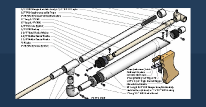Edited by notorious_oxide, 03 February 2006 - 02:49 AM.

1 reply to this topic
#1

Posted 03 February 2006 - 02:42 AM
I wasnt sure where to post this because it didnt seem to fit anywhere and i wasnt sure about it being suitable for off topic. This seems to me like a stupid question, but is PVC riser similar to ABS? Im thinking its probly not because of the name (PVC riser) but i have seen many places where people call things what they are not, eg. at my home hardware they call electric conduit electric pvc. But if im wrong then forgive me.
-------
COREY
COREY
#2

Posted 03 February 2006 - 03:17 PM
I spent a few minutes looking through my Port Plastics Tech Manual. I hope this helps:
ABS - Acrylonitrile Butadiene Styrene
PVC - Polyvinyl Chloride
As you can see from the names, they are completely different plastics. The data sheets I have available on them make it look like they are very similar in performance with a few exceptions. ABS is limited in it's chemical resistance, doesn't handle petroleum oils well, is hygroscopic (absorbes moisture), can have a huge range of color and is very inexpensive. PVC has excellent chemical resistance, is more flame retardant than ABS, but is a little more spendy. Our Nerf guns, like most other children's toys, are mostly ABS, I believe.
On a practical level, none of this really matters. The only thing I could think of would be if you were trying to weld a piece of ABS to a piece of PVC using a solvent. Because of the different chemical structures involved, I'm not sure you would get a good weld, if at all. I'm not a chemist and I've never tried joining the two, so I can't really say. This is probably of no consequence either, since hot-glue and tape seem to be the method of choice for joining parts.
8-
ABS - Acrylonitrile Butadiene Styrene
PVC - Polyvinyl Chloride
As you can see from the names, they are completely different plastics. The data sheets I have available on them make it look like they are very similar in performance with a few exceptions. ABS is limited in it's chemical resistance, doesn't handle petroleum oils well, is hygroscopic (absorbes moisture), can have a huge range of color and is very inexpensive. PVC has excellent chemical resistance, is more flame retardant than ABS, but is a little more spendy. Our Nerf guns, like most other children's toys, are mostly ABS, I believe.
On a practical level, none of this really matters. The only thing I could think of would be if you were trying to weld a piece of ABS to a piece of PVC using a solvent. Because of the different chemical structures involved, I'm not sure you would get a good weld, if at all. I'm not a chemist and I've never tried joining the two, so I can't really say. This is probably of no consequence either, since hot-glue and tape seem to be the method of choice for joining parts.
8-
1 user(s) are reading this topic
0 members, 1 guests, 0 anonymous users










